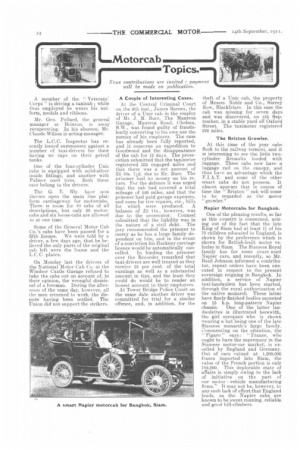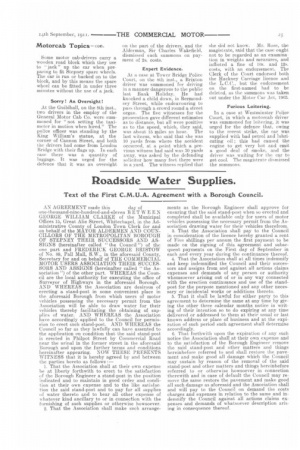Topics.
Page 4

Page 5

If you've noticed an error in this article please click here to report it so we can fix it.
News contributions are invited : payment — will be made on publication.
A member of the " Veterans' Corps" is driving a taxicab ; while thus employed he wears his uniform, medals and ribbons.
Mr, Geo. Pollard, the general manager at Brixton, is away recuperating. In his absence, Mr. Claude Wilson is acting-manager.
The L.C.C. inspector has recently issued summonses against a number of taxi-drivers for their having no caps on their petrol tanks.
One of the four-cylinder Unic cabs is equipped with solid-silver inside fittings, and another with Palmer cord tires. Both these cars belong to the drivers.
The G. E. Rly, have now thrown open the main line platform carriageway for motorcabs. There is room for 4.0 cabs of all descriptions, but only 20 motorcabs and six horse-cabs are allowed in at one time.
Some of the General Motor Cab Co.'s cabs have been passed for a fifth licence. We were told by a driver, a few days ago, that he.believed the only parts of the original cab left were the frame and the L. C.C. plates.
On Monday last the drivers of the National Motor Cab Co. at the Windsor Castle Garage refused to take the cabs out on account of, in their opinion, the wrongful dismissal of a foreman. During the afternoon of the same day, however, all the men returned to work, the dispute having been settled. The Union did not support the strikers. A Couple of Interesting Cases.
At the Central Criminal Court on the 9th inst., James Barnes, the driver of a Unic cab in the employ of Mr. J. M. Burr, The Manresa Garage, Manresa Road, Chelsea, S.W., was found guilty of fraudulently converting to his own use the monies of his employer. The case has already been fully reported, and it concerns an expedition to Goodwood and the disappearance of the cab for 12 days. The prosecution submitted that the taximeter registered 335 engaged miles and that there was a net amount of £6 10s. 722d. due to Mr. Burr.The prisoner had no money on his return. For the defence it was urged that the cab bad covered a total mileage of 526 miles, and that the prisoner had paid garage expenses, and sums for tire repairs, etc., bills for which were produced. A balance of £2 lls., however, was due to the prosecutor. Counsel submitted that the liability was in the nature of a civil debt. The Jury recommended the prisoner to mercy as he has a large family dependent on him, and in the event of a conviction his Hackney carriage licence would be automatically can
celled. In binding the prisoner over the Recorder remarked that taxi-drivers are well treated as they receive 25 per cent. of the total earnings as well as a substantial amount in tips, and the least they could do would be to render an honest account to their employers.
At Tower Bridge Police Court on the same date another driver was committed for trial for a similar offence, and, in addition, for the theft of a Unie cab, the property of Messrs. Noble and Co., Surrey Row, Blackfriars. In this case the cab was missing for seven days and was discovered, on 4th September, in a stable yard off Oxford Street. The taximeter registered 222 miles.
The Brixton Growler.
At this time of the year cabs flock to the railway termini, and it is interesting to see the little twocylinder Renaults loaded with luggage. These cabs now have a luggage rail on the canopy, and thus have an advantage which the F.I.A.T. and some of the other smart cabs do not possess. It almost appears that in course of time the " Brixton " cab will come to be regarded as the motor " growler."
Napier Motorcabs for Bangkok.
One of the pleasing results, so far as this country is concerned, arising out of the fact that the late King of Siam had at least 1l of his 70 children educated in England, is shown by the preference which is shown for British-built motor vehicles in Siam. The Siamese Royal family has for some years used Napier cars, and recently, so Mr. Basil Johnson informed a contributor, repeat orders have been executed in respect to the present sovereign reigning in Bangkok. In addition, a service of Napier taxi-landaulets has been started, through the royal authorization of the native monarch. These latter have finely-finished bodies mounted on 15 h.p. long-pattern Napier
chassis. One of the latter landaulettes is illustrated herewith, the OH occupant who is shown wearing a hat being one of the late Siamese monarch's large family. Commenting on the situation, the " Figaro " says "France, who ought to have the supremacy in the Siamese motor-car market, is excelled by England and Germany. Out of cars valued at 1,200,000 francs imported into Siam, the value of the French portion is only 182,000. This deplorable state of affairs is simply owing to the lack of initiative on the part of our motor vehicle manufacturing firms." It may not be, however, to any such lack of effort that England leads, as the Napier cabs are known to he sweet running, reliable and good hill-climbers.
Some motor cab-drivers carry a wooden road block which they use to " jack" up the car when preparing to fit Stepney spare wheels. The car is run or backed on to the block, and by this means the spare wheel can be fitted in under three minutes without the use of a jack.
Sorry! An Oversight: At the Guildhall, on the 8th inst., two drivers in the employ of the General Motor Cab Co. were summoned for "not settiniT the taximeter in motion when hired." The police officer was standing by the King William's statue, at the corner of Cannon Street, and both the drivers had come from London Bridge with their flags up. In each case there was a quantity of luggage. It was urged for the defence that it was an oversight on the part of the drivers, and the Alderman, Sir Charles Wakefield, dismissed each summons on payment of 2s. costs.
Expert Evidence.
At a case. at Tower Bridge Police Court, on the 8th inst., a Brixton driver was summoned for driving in a manner dangerous to the public last Bank Holiday. He had knocked a child down, in Bermondsey Street, while endeavouring to pass through a crowd round a street organ. The five witnesses for the prosecution gave different estimates as to distance, but all were positive as to the speed, which, they said, was about 15 miles an hour. The last witness, who said that she was 10 yards from where the accident occurred, at a point which a previous witness had said was 30 yards away, was asked by the defending solicitor how many feet there were in a yard. The witness replied that
she did not know. Mr. Rose, the magistrate, said that the case ought not to be regarded as an examination in weights and measures, and inflicted a fine of 10s. and 12s. costs, with an endorsement. The Clerk of the Court endorsed both the Hackney Carriage licence and the E.C.C., but the endorsement on the first-named had to be deleted, as the summons was taken out under the Motor Car Act, 1903.
furious Loitering.
In a ease at Westminster Police Court, in which a motorcab driver was summoned for loitering, it was urged for the defence that, owing to the recent strike, the car was supplied with bad petrol and lubricating oil ; this had caused the engine to get very hot and emit a good deal of smoke, and the driver was waiting for the car to get cool. The magistrate dismissed the summons.




















